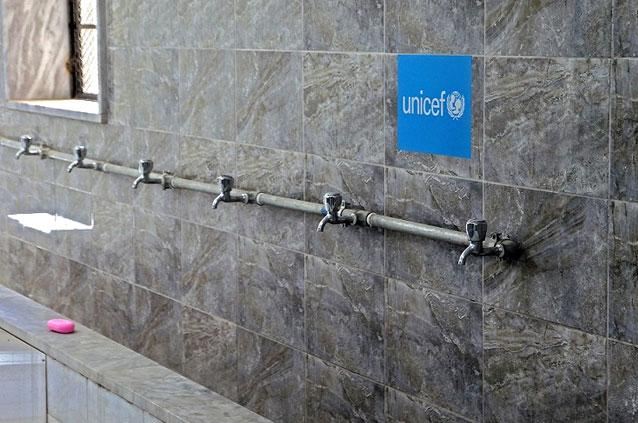- Local News
- Web-2020-09-02 | 12:18 am

"Ensuring that children who are returning to learning have access to basic handwashing, clean water and proper sanitation are critical for the safe reopening and operations of schools in the midst of the COVID-19 pandemic,” said UNICEF Jordan Representative Tanya Chapuisat, speaking at Samir Al Refa’I School in Amman on Monday.
The UNICEF representative was joined by Director of Education Management, Ministry of Education, Sami Al Mahasis. UNICEF has supported the school with improved water and sanitation facilities, including the installation of drinking water stations and a greywater system for toilets to promote sustainable water use, as well as the provision of soap to create a safe learning environment for all students.
The UNICEF WASH in schools programme — designed to improve water and sanitation facilities in schools across Jordan and promote climate action — was urgently scaled up during the summer months in response to the COVID-19 pandemic. Quick maintenance projects were carried out in 46 schools to rehabilitate handwashing facilities, the statement said.
The donation of half a million bars of soap and 14,000 bottles of hand sanitiser is enough to ensure that every public school in the country, including in refugee camps, has adequate supplies to cover the first couple of months as they resume operations, noted the statement.
The distribution will be complemented by hygiene awareness initiatives to teach students how to practise proper handwashing.
Ahead of the reopening of schools, UNICEF, in coordination with the Ministry of Education, has provided Infection Prevention Control (IPC) training to education and health focal points in all directorates so that the expertise to prevent and control the transmission of COVID-19 is present at the school level.
Only one in three schools in Jordan has basic, functional and dignified sanitation services, increasing the risk of disease and adding greater barriers to girls’ education.
UNICEF’s WASH in schools programme, and scaled-up WASH COVID-19 response, is generously funded by Australia, Canada, Irish Aid, Japan and the Korea International Cooperation Agency, according to the statement.









